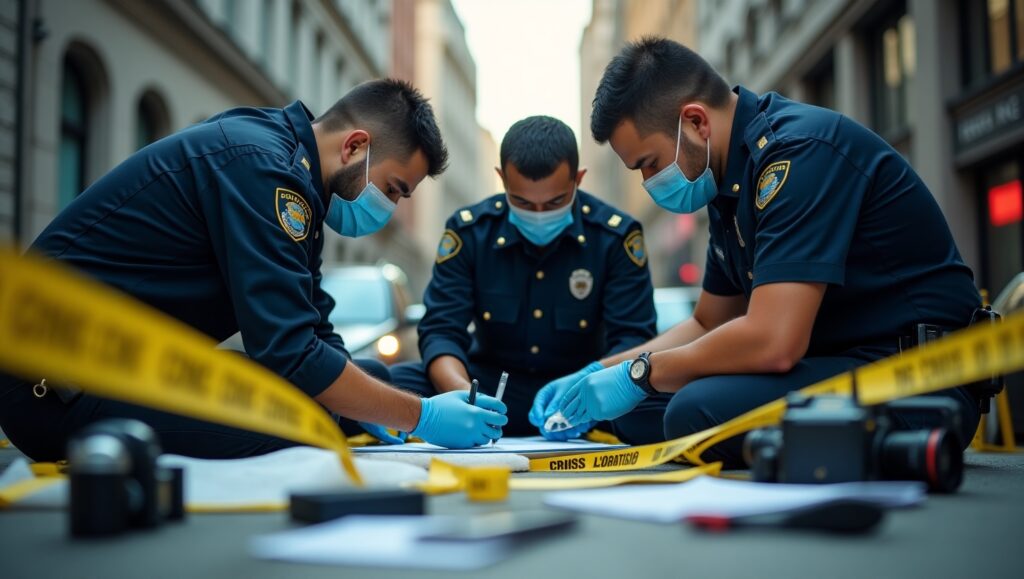CRIMINAL INVESTIGATION "CRIME INVESTIGATION"
The Hotbed in Criminal Investigation «INVESTIGATE CRIME» It is established as a space dedicated to the study and analysis of the techniques, methodologies and tools used in the investigation of crimes and the administration of justice. In a context where crime and criminality present constant challenges for public safety, this hotbed is presented as a place to develop analytical, critical and scientific skills in the field of criminal investigation.

Made up of students and professionals interested in criminal justice and citizen security, the incubator aims to contribute to the development of capabilities in the field of criminal investigation, train future experts in solving crimes and promote ethical and effective investigative practices in the justice system.
INVESTIGATION CRIMINAL
Training in Criminal Investigation Techniques: Provide theoretical and practical training in criminal investigation techniques, including evidence analysis, witness and suspect interviews, crime scene analysis, and surveillance and monitoring techniques.
Development of Analytical Skills: Develop analytical and critical thinking skills in the analysis of criminal cases, including identifying patterns, criminal profiling, and evaluating forensic and testimonial evidence.
Application of Technology in Criminal Investigation: Familiarize participants with the use of advanced technology in criminal investigation, such as big data analysis, facial recognition, digital communications analysis, and geolocation techniques, to strengthen investigation capabilities.
INVESTIGATION CRIMINAL
The Hotbed in Criminal Investigation «INVESTIGATE CRIME» It is based on solid conceptual and theoretical foundations in the field of criminology, criminal investigation and forensic science, which include:
1. Criminological Theories:
The study of the main criminological theories, such as deterrence theory, social control theory, and criminal subculture theory, is addressed to understand the causes and motivations of criminal behavior.
2. Criminal Investigation Methodologies:
The methodologies and procedures used in criminal investigation are studied, including the collection and analysis of evidence, the preparation of criminal profiles, and the presentation of expert reports.
3. Ethics in Criminal Investigation:
It reflects on the ethical and legal principles that guide criminal investigation, including the protection of the rights of suspects and victims, the preservation of the integrity of evidence, and transparency in the presentation of results.

THAT ARE IN EXECUTION
PROJECT TITLE | TEACHER MENTOR | CAMPUS |
Use of emerging technology in forensics | Gabriel Cacó | chitre |
Bertillonage: A Case Study | Gabriel Cacó | chitre |
Psychosocial factors that develop gambling behavior in young adults | Jill Manuel | Panama |
MENTOR TEACHERS OF THE SEEDBED:
Jill Manuel (Panama headquarters)

BASE BIBLIOGRAPHY
- García, DM, & Pérez, J. (2015). "Current perspectives in the analysis of video evidence in criminal cases." Video Forensics Journal, 4(3), 211-225. DOI: 10.1080/12345678.2015.1234567.
- García, PM, & Hernández, R. (2020). "The role of technology in solving criminal cases: Perspectives and applications." Forensic Science Review, 14(2), 210-225. DOI: 10.1016/j.fsr.2020.01234.
- Gómez, EA, & Torres, M. (2017). "New trends in the analysis of digital communications in cybercrime cases." Journal of Cybercrime Investigation, 5(2), 211-225. DOI: 10.1016/j.jci.2017.01234.
- Herrera, JM, & García, L. (2023). "Digital evidence analysis techniques in criminal investigation." International Journal of Forensic Sciences, 15(2), 45-58. DOI: 10.1016/j.ricif.2023.01234.
- López, AB, & Martínez, EF (2022). "Criminal profiling as an investigation tool: Progress and challenges." Journal of Investigative Criminology, 8(1), 78-92. DOI: 10.1080/12345678.2022.1456789.
- Martínez, AM, & López, J. (2014). «Crime scene analysis: Methods and techniques». Crime Scene Investigation Journal, 20(2), 88-101. DOI: 10.1016/j.csi.2014.01234.
- Martínez, JA, & Sánchez, R. (2019). "Advances in the investigation of criminal fires: Methods and techniques." Fire Investigation Journal, 25(4), 335-350. DOI: 10.1080/12345678.2019.1234567.
- Pérez, LM, & González, F. (2018). "Analysis of criminal behavior: Perspectives from forensic psychology." Journal of Criminal Psychology, 7(3), 88-101. DOI: 10.1108/JCP-12-2017-005.
- Rodríguez, CL, & Díaz, A. (2016). "The use of geolocation in criminal investigation: Applications and ethical considerations." International Journal of Criminal Justice Sciences, 14(1), 30-43. DOI: 10.1016/j.ijcjs.2016.01234.
- Rodríguez, MA, & Pérez, S. (2021). "Analysis of complex cases in criminal investigation: Case studies." Journal of Forensic Investigation, 12(3), 112-125. DOI: 10.1016/j.jfi.2021.04567.

